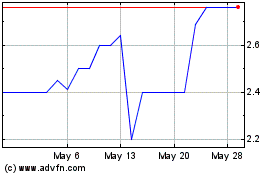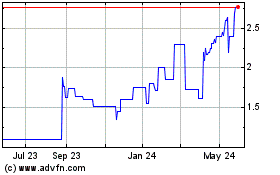Turkey's Sovereign Wealth Fund Seeks International Investors
February 17 2017 - 9:44AM
Dow Jones News
By Margaret Coker and Yeliz Candemir
ISTANBUL--Turkey's newly created sovereign-wealth fund is
conducting a valuation process of its blue-chip state enterprises
as part of a planned drive to attract more overseas investment, the
fund's director Mehmet Bostan said Friday.
Turkey Wealth Fund has hired international accounting firms for
the audit of the varied group of companies that were transferred to
its control by the government earlier this month. These include
stakes in Turkish Airlines, Turk Telekomunikasyon AS, the country's
largest landline operator and internet-service provider, the
nation's energy pipeline company BOTAS and state-owned oil company
TPAO.
Mr. Bostan told The Wall Street Journal that the investment and
management goals of the fund are based on conservative, long-term
investment principles aimed at increasing the value of the state
enterprises via foreign investment, domestic job creation and
maximizing the government's macroeconomic growth strategy.
He said the fund isn't seeking to privatize the state
enterprises under its control, but rather help them attract foreign
investment as a way to expand operations. Although the fund has the
authority to invest in both domestic and international markets, he
doesn't expect to be going on an asset buying spree in the near
future.
"Our main playing field is the portfolio we have been given,"
said Mr. Bostan. "From the cash that these companies generate...we
will use it in markets and use it smartly. We want to be a platform
for foreign investors in both capital markets and other
investments."
Turkey formally established the fund in late 2016 at a time of
escalating instability in which Turkey posted its first negative
growth rate in eight years. The Turkish lira had depreciated by
more than 20% in annual terms against the U.S. dollar and the
country was becoming polarized over the radical political reform
program of President Recep Tayyip Erdogan that aims to change the
structure of Turkey's democracy.
At the same time, investors have grown wary of the extraordinary
powers the government has used since it declared a state of
emergency after the failed July 15 coup.
Investors are particularly concerned over the seizure of
hundreds of businesses without judicial review due to their alleged
links to a U.S. based cleric Fethullah Gülen. The Turkish
government blamed Mr. Gülen for masterminding the failed coup and
jailed tens of thousands of people on accusations of supporting
terrorism or the coup plotters. Mr. Gülen denies any role in the
summer's military insurrection.
All three international ratings firms classify Turkey at junk
status, citing in part the continuing political instability.
In this turbulent atmosphere, Mr. Bostan, who left Turkey's
privatization administration to take on his job in early November,
is completing the hiring of a four-person team who would be in
charge of the fund's investments based on a strategy that he
described as focused on low-risk, long-term returns.
The top candidates for the management jobs--who are all Turkish
nationals--have extensive experience in international banking and
multinational corporations, he said.
Meanwhile, a full audit and valuation process for the
enterprises under the fund's control is expected to be completed in
a few months, he said. At that stage, the fund will seek government
approval for a five-year strategy that he expects to be financed by
raising cash on international money markets.
Mr. Bostan said it was too early to talk about the size of any
bond offerings, as the fund still has no idea the size of the
assets it has under management. "I can't even tell you an
approximate figure," he said in an interview in his Spartan offices
located in the headquarters of Borsa Istanbul, Turkey's main stock
exchange.
Critics and analysts of Turkey's economic strategy have raised
questions about the creation of the fund at a time when political
pressure has weakened the independence of financial regulators as
well as the checks and balances of government bodies. They fear
that the fund will become an alternative revenue pool for
controversial infrastructure projects favored by the ruling party,
to the detriment of the state enterprises themselves.
Mr. Bostan said that the fund would abide by international
standards of transparency and it will have strong internal audit
mechanisms as well as face independent auditors on a regular
basis.
"It should be easy for international investors to look to us for
opportunities. We have a strong background with the government. We
are adopting best practices. We have a very diverse asset set," Mr.
Bostan said.
The fund's operations may also be adversely affected by the
country's political uncertainty. The nation will be voting in
mid-April on a referendum to approve a constitutional reform
package that envisages a strong executive presidency and abolishing
the office of the prime minister. Current legislation has the fund
reporting directly to the prime minister and the cabinet.
Mr. Bostan didn't have any answer as to what changes in his
statutory reporting obligations there could be if the referendum
passed.
Write to Margaret Coker at margaret.coker@wsj.com and Yeliz
Candemir at yeliz.candemir@wsj.com
(END) Dow Jones Newswires
February 17, 2017 10:29 ET (15:29 GMT)
Copyright (c) 2017 Dow Jones & Company, Inc.
Turk Telekomunikasyon (PK) (USOTC:TRKNY)
Historical Stock Chart
From Jan 2025 to Feb 2025

Turk Telekomunikasyon (PK) (USOTC:TRKNY)
Historical Stock Chart
From Feb 2024 to Feb 2025
